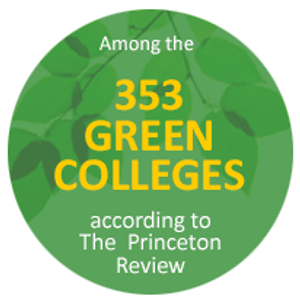
Catawba College is again receiving national recognition for being one of the country’s most environmentally responsible "green" colleges. Catawba was among 353 higher education institutions included in The Princeton Review’s "Guide to 353 Green Colleges: 2015 Edition" that was released April 16.
This is the sixth year for the publication that is free and downloadable from The Princeton Review’s website http://www.princetonreview.com/college-rankings/green-guide. It is the third consecutive year that Catawba has been included in this annual edition. Catawba and other institutions were included in the 2015 edition based on their 2014 Green Rating scores (of 60 to 99). Catawba earned a score of 89 based on its academic offerings and career preparation for students, campus policies, initiatives, and activities which demonstrate an exceptional commitment to sustainability.
Catawba boasts a formal Sustainability Committee, a Public Green House Gases Inventory Plan, and offers several sustainability-focused degrees. Catawba’s sustainability profile, included in this publication, reads like this:
Since signing the ACUPCC, Catawba College has built a vision for a sustainable future—thanks in part to its Environmental Services Department and Center for the Environment. The department plans, implements, and maintains “environmental sustainability, waste reduction, and recycling programs for the college community.” The Center for the Environment, a non-profit entity with programs that extend beyond campus boundaries, focuses on providing “education and outreach on prevalent environmental challenges that can serve as models for programs throughout the country.” These two groups have helped Catawba College take many steps on the path to climate neutrality by 2030, including the purchase of renewable energy credits representing 45 percent of the college’s energy usage. The college has also achieved LEED certification for the Abernethy Village, a complex of five residence halls on campus. Replete with energy efficient lighting, Energy Star appliances, geothermal heating, and high-efficiency windows, it’s no wonder that the college reserves these appealing abodes exclusively for juniors and seniors. Dining Services has taken the “buy local” movement to heart, now ensuring that more than half of its food expenditures go towards local, organic, or otherwise environmentally preferable food. Working closely with the Center for the Environment is Environment Catawba Outreach (ECO), a student group for those looking to lead the campus on current and future sustainability initiatives. For those looking for a more formal education in the environment and sustainability, Catawba College offers majors in environmental science, environmental studies, environmental education, and, unique to the college, sustainable business and community development.
The Princeton Review (www.princetonreview.com) is a leading test preparation, tutoring, and college admission services company. Every year, it helps millions of college- and graduate school-bound students achieve their education and career goals through online and in person courses delivered by a network of more than 4,000 teachers and tutors and its more than 150 print and digital books published by Penguin Random House. The Princeton Review is headquartered in Natick, MA, and is an operating business of IAC (NASDAQ: IACI).
